
|
Marian Rejewski died 30 years ago of heart failure at his home in Zoliboz, Warsaw on the 13th February, 1980. He rests in peace in the Pawazki Cemetery where many other Polish heroes are buried. It is incumbent on we the living to keep his achievements known to the world. How many times have you come across the opinion that it was the British that broke Enigma? I think I've heard this line more than most because of my interest in history. People without a Polish background are nonplussed when I ask them if they have heard of Marian Rejewski. They are dumbfounded when I describe the achievements of Marian Rejewski, Henryk Zygalski, Jerzy Rozycki and the Biuro Szyfrow (Cipher Bureau), in solving Enigma in late December 1932, and devising methods to read German encrypted messages throughout the 1930s and beyond. They are astonished to hear that the equipment and methods were donated to the British before the start of WWII. They have no answer when I ask why they are ignorant of, what they agree is a fascinating and compelling story.
Wladyslaw Kozaczuk revealed Polish WWII codebreaking accomplishments in his 1967 book, 'Bitwa o Tajemnice' (Battle for Secrets), as did Gustave Bertrand in, Enigma ou la plus grande énigme de la guerre 1939-1945 (Enigma: the Greatest Enigma of the War of 1939-1945), Paris, Librairie Plon, 1973. In the English speaking world, however, the perception of WWII codebreaking became influenced by many British publications of the early 1970s that either omitted the entire Polish trail blazing history, or they trivialised or falsified it. Authors of second world war documentary soundtracks continue to do so. This has led to the belief that it was the British codebreakers at Bletchley Park that cracked 'Enigma'.
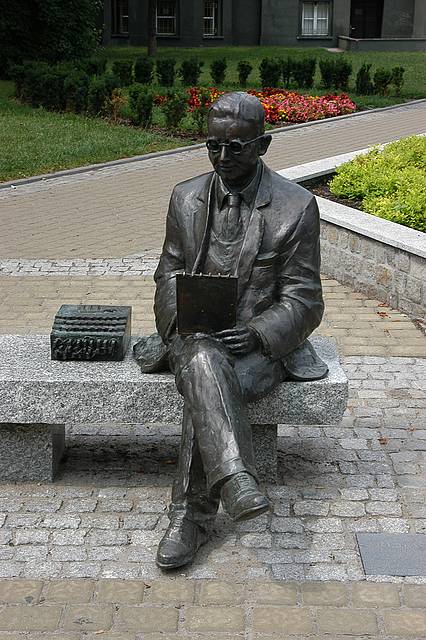
Pomnik Rejewskiego w Bydgoszczy |
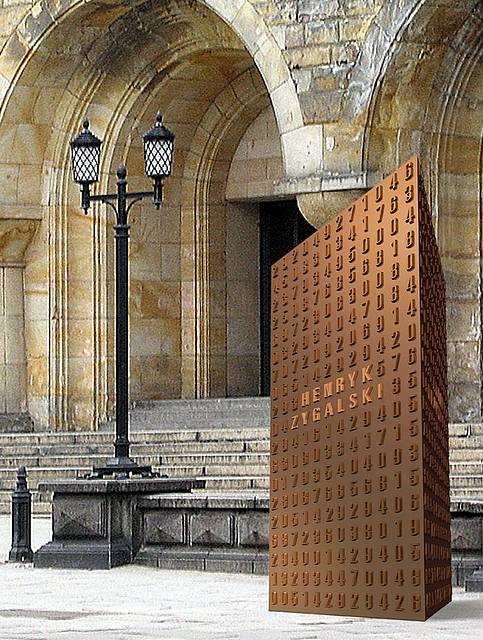
Pomnik słynnej trójcy w Poznaniu |
If you asked passers by on the streets of London, New York or Sydney 'who broke Enigma?', I would guess the majority who knew a little about this topic would err and give credit to the British. Does it matter? Yes it does. I agree with Jan Nowak-Jezioranski, the renowned 'Courier from Warsaw':
It is necessary to fight without respite for the world to appreciate the scale of the Polish contribution to the defeat of Hitler. In the final analysis, from the point of view of her military potential, Poland was a small country. She was defeated, subjugated, deprived of her own government and state authorities. But despite this, she was still able to continue the struggle and deal lethal blows to her enemy. Because, let's say it openly, the sharing of the Enigma secret was virtually decisive to the further course of the war.

Saxon Palace - miejsce pracy Rejewskiego |
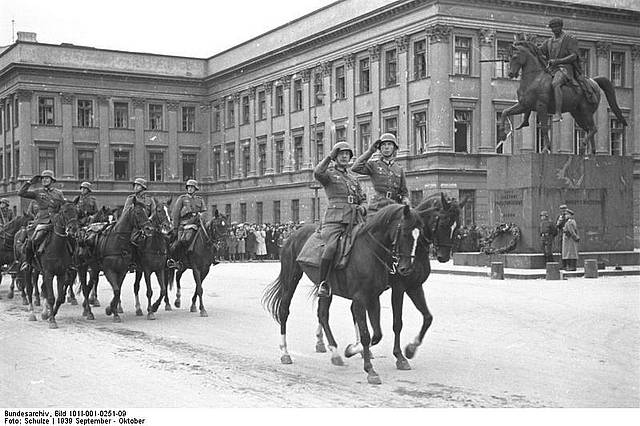
Tenże sam pałac, w którym pracował Rejewski |
Frankly speaking, as I ponder this issue, I cannot conceive of an Allied victory without their knowledge of enemy plans and the opportunity to adapt their own intentions and plans accordingly. Poland's share in the victory over Hitler was disproportionate to her potential, and yet it remains largely unknown in point of fact. We may take pride in this, but what of it?
The point is to make the world see how a small country managed to turn the balance of fate.
I attach special significance to this conference, which is to consider this aspect. I believe that it will shed more light on the facts, but even more so, it will rescue them from oblivion. That is what's most important, not to forget this exceptionally glorious episode in our history. Every nation longs after military glory. Poland has a valid claim to that, and the title to defend it and prevent others from misappropriating this glory. 1905-1980 Marian Rejewski: Living with the Enigma Secret, 2005 P13.
This is an interesting, expensive and difficult to find book, but it is well worth the read if you want to discover more about Marian Rejewski and the Polish code breaking story. It had a print run of only 1500. It is from the conference on 'The Enigma Secrets' in Bydgoszcz, 2004 on the 65th anniversary of the handing over of ‘Enigma' to the Allies. Fifteen experts contributed to this volume including Professor Jan Ciechanowski, Professor Wojciech Polak, Dr Grzegorz Nowik and Dr David Khan, with a preface by Zbigniew Brzezinski.
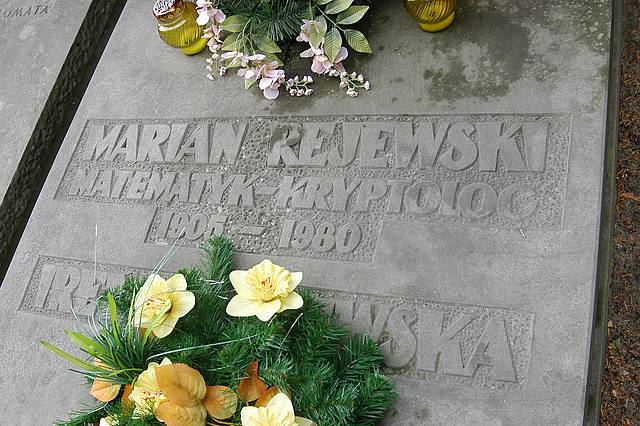
|
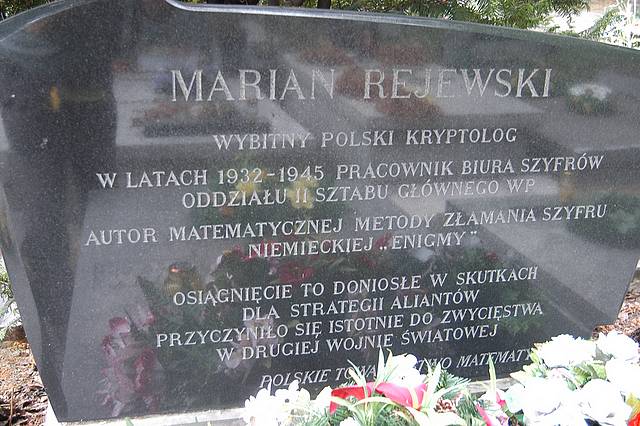
|
Polish people unjustly suffered much death and destruction during and after WWII, and the stealing of Polish heroism and ingenuity is intolerable. Why should Poles be deprived of heroes? Why should their accomplishments be misappropriated? Why shouldn't they have people to look up to, to try to emulate and be inspired by? Positive role models give you a sense of pride in your forebears. Vistas of opportunities may be opened to young impressionable minds motivated with thoughts like - 'look at what they did under their circumstances' - whetting their appetite for achievement.
Marian Rejewski, the leading member of the Polish codebreaking trio, is well worth 'looking up to', and not only by people of Polish heritage. Military historian, David Khan, has described his mathematical solution of the internal wiring of the Enigma rotors as one of the greatest feats of cryptography of all time. A standout contributor to the defeat of the Nazis, his biography has been neglected far too long in the English speaking world. He was nearly seventy years old before the world spotlight focused on his striking achievement in breaking Enigma. But what sort of person was he?
Wladyslaw Kozaczuk doesn't use a thousand words to give us a portrait of a modest, quiet, dignified and uncomplaining man, yearning to contribute to mankind. Writing in regard to Rejewski's solution of an enciphered Pilsudski message, dated 26th of April 1904 in an article titled 'A New Challenge for an Old Enigma Buster' Cryptologia, Volume 14, No3, July 1990, Kozaczuk paints a picture of his most enduring memory of his close friend:
"One last remark on the cipher from the 1904-1905 Russo-Japanese War. Rejewski cracked it in August 1976 when he was 71 and had been ailing for several months, the thing I possibly best remember of what he told me when I arrived that day to see and appreciate the results of his efforts was a reflective remark he uttered, looking rather absent-mindedly out of an open window towards some imaginary horizon which he alone could see.
'You know,' he said 'something durable can surely be expected from anyone who claims to be a cryptologist, a codebreaker. Do you agree?'
It may seem a trivial moment to recall, but with a little contemplation I can see Rejewski's reflective 'look' and hear the words he spoke that, hitherto, had lingered only in Kozaczuk's memory. Rejewski comes across as quiet, unassuming person with a desire to help humanity.
For his immense impact in helping hundreds of thousands of people survive WWII and survive in better health and circumstances than might have been the case without his achievements, Marian Rejewski deserves induction into the pantheon of Polish heroes as exemplar to future generations.
However, since 'defeat is an orphan but victory has a thousand fathers', the battle over Rejewski and 'Enigma History' continues. To their shame, some British documentary makers and writers continue to act like pickpockets. It grates on me when I watch recently produced documentaries and hear commentary, spoken in a self congratulatory tone, that credits the British for breaking Enigma.
I am aware of the massive amount of material published in English that gives an accurate account of the ‘Enigma' story. For instance, Ron Lewin and Gordon Welchman are two expert cryptographers that have given appropriate credit to the Poles. A clearer picture continues to emerge as more documents become declassified. Researchers are still going through communist archives since 1989. Some things have yet to become declassified, especially by Britain, so we can expect further light to fall on this subject in the future.
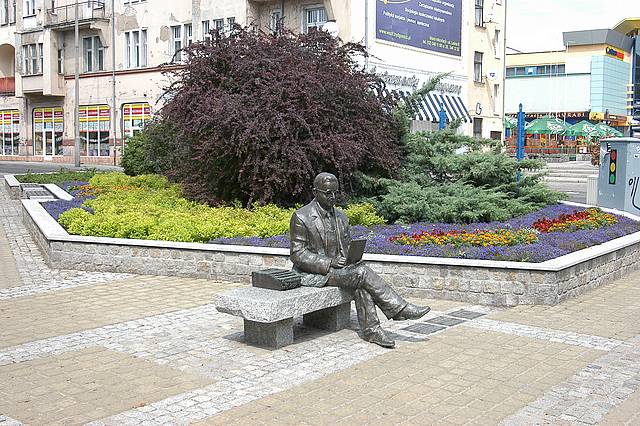
Skwer w Bydgoszczy |
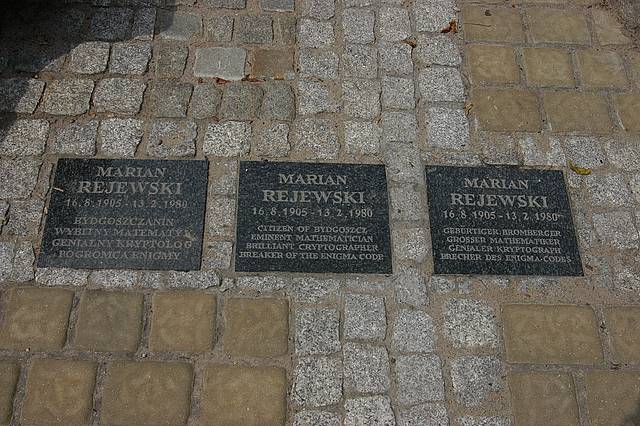
Tablice pami±tkowe w Bydgoszczy |
One thing that has not changed is that never in the history of cryptography have such gifts of priceless value been passed by one nation to another at a most critical moment, with nothing being asked in return, other than acknowledgment of source, and the implied expectation of the 'non betrayal' of Poland after Allied victory over the Axis powers had been secured. From this frame of reference the story of Enigma is one of great injustice.
Today, there is no excuse for not giving a true account of this story. You can imagine my disgust when I heard a Bletchley Park guide belittle the Polish contribution when I visited this museum in July 2006. Paraphrasing the guide, he said that after a lucky guess, Marian Rejewski was the first to work out how the military Enigma worked. He was helped by the French, who virtually ran the Polish underground in those days. When the people at Bletchley Park were given an Enigma replica they worked out methods and innovated equipment to read German encrypted messages throughout World War II.
This from an OFFICIAL guide at Bletchley Park in 2006!!! I had to clarify the issues for the benefit of the other visitors. The French never ran the Polish underground. The Ashe (Hans Thilo Schmidt) material was given to the British first and sent to the Poles later, only as an afterthought. At the July 1939 Pyry meeting in the Kabaty Woods, the Polish Cipher Bureau not only gave the British an Enigma replica, but they instructed them in the decryption methods they had devised over the past seven years. Copies of the equipment Rejewski, Zygalski and Rozycki had innovated, such as the Perforated Sheets, the Cyclometer and the Bomba were given to them. For the rest of my Bletchley Park tour I could feel the guide's resentment at being corrected in this way.
Rejewski, Zygalski, Rozycki et al did their decryption work at the Cipher Bureau (Biuro Szyfrow) located in the Saxon Palace, but later on they moved to roomier and more secure premises in the Kabaty Woods, near Pyry, just south of Warsaw. The German victory parade in front of this building proved in the end to be premature. Their fate had been sealed by a few brilliant minds working there just a few years before. Wonderful, the fullness of time!
Despite the well researched, truthful and accurate books published about Enigma in English, the false material that continues to be propagated, even today, has terribly clouded the Enigma story. The attempted theft of Polish heroism and ingenuity seems to consist of five false memes manifested as:
• Total omission - total credit for breaking enigma is attributed to the British because the pioneering work of Polish codebreakers was ignored in English language publications.
• Partial omission - some publications gave credit to Rejewski, Zygalski, Rozycki et al for making a replica of Enigma and giving it to British codebreakers, however, the fact that the Polish team had instructed the British about the methods the Polish Cipher Bureau had innovated for discovering daily 'keys' was omitted. The methods had been refined over seven years in response to the Germans adding hurdles to their system to make it even more unbreakable. The fact that copies of code breaking equipment and materials as well as operational instructions were donated to the British was also omitted.
• Falsification - Yes Poles helped, they stole or bought an enigma machine and passed it on to the British, who then solved it
• Luck - The original breakthrough occurred because of a lucky guess, and because of French help only given to Poland.
• Trivialisation - Polish cryptographers were lucky breaking enigma but German methods became more sophisticated and the Poles were too dumb to cope with the changes. The British were brilliant in managing to overcome these much more difficult problems. (This is the most recent and prevalent distortion of the history behind the breaking of ‘Enigma').
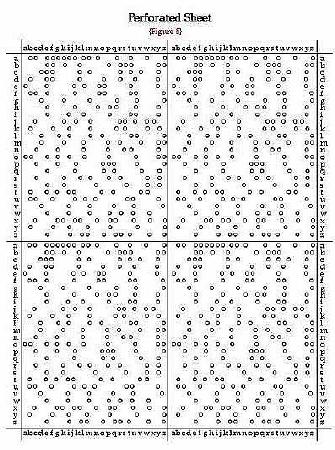
Tablice Zygalskiego |
The battle continues. How can you help? Become informed and stand up for the truth at every opportunity. Don't fail to point out that the Polish Cipher Bureau successfully overcame every change the Germans had made in strengthening Enigma up to the point when war broke out and Poland was overrun. How then could anyone logically conclude that Rejewski, Zygalski, Rozycki would no longer have the mental capacity to cope with future changes? Between 1933 and 1939, the Polish codebreakers were able to innovate counter measures to the German improvements and throughout this time they continued reading Enigma encrypted material in clear German. The only conceivable reason for them no longer being able to do so was the fact that Poland was about to be overrun, and their achievements would be discovered by the Germans, and they risked being captured if they continued working in Poland.
Sometimes it is suggested that the leading English codebreaker, Dillwyn Knox, was beaten by Rejewski in breaking Enigma only by a whisker. This conclusion is reached solely because of Knox's reaction at the Pyry meeting, in July 1939, to the answer he was given about the wiring arrangement at the entry point of the Enigma machine's scrambling section. If Knox really was close, why was he unable to mathematically solve the internal wiring of the two new rotors the Germans introduced to the Naval Enigma? He had enormous advantages. All the resources and manpower of Bletchley Park at his disposal, use of the donated Polish devices, Rejewski's methods and sample solutions - Rejewski himself had instructed Knox at Pyry. Furthermore, Knox had a much greater quantity of encrypted messages to play around with and he never had to worry about being overrun or captured by the Nazis.
Dillwyn didn't do it! The wiring was only discovered long afterwards when a naval Enigma, together with all its rotors and monthly settings, was retrieved by the British Navy from U110. In the mean time many allied ships were sunk for want of good intelligence. Rejewski was in England during this period and, to the shame of those in charge of the Government Codes and Cipher School, they refused to seek his assistance, even though he had used his theorem to deduce the wiring of all rotors used in Enigma machines up to that point.
Knox failed to shine on a previous occasion, too. The British had made copies of the perforated sheets Zygalski had devised for detecting daily Enigma keys. The Bletchley Park codebreakers couldn't get them to work, nor could they find the snag. Knox and Turing had to come to France to get assistance from the Polish codebreaking trio, who were decrypting German Enigma messages at PC Bruno, just outside of Paris. The Poles quickly ironed out the problem; the two turnover notches on rotors IV and V had been accidentally transposed. (see Stephen Budiansky: Battle of Wits, The Free Press, 2000. Pp 132-133)
On the 30th anniversary of Marian Rejewski’s death think about him and what he did and share what you now know with others to help keep alive the memory of this champion of liberty. When in Poland be sure to see the bronze monument to the three cryptologists outside Poznan University’s Mathematics Institute at Poznan Castle and the Marian Rejewski monument on a sidewalk and garden at Bydgoszcz.
Felix Molski
| 

